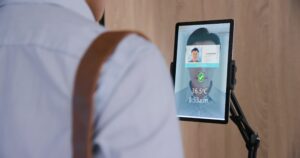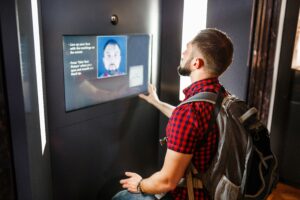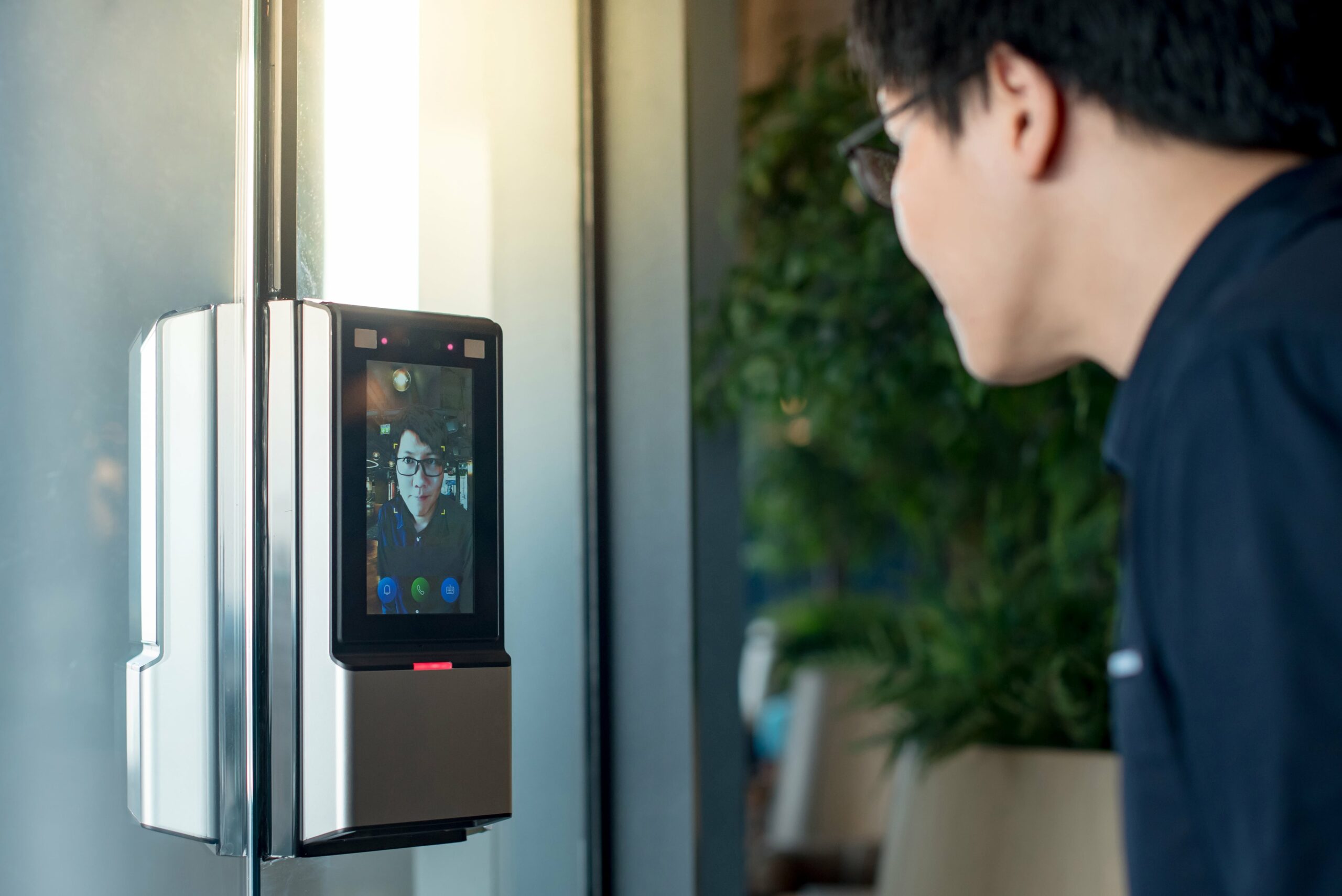Face recognition access control transforms security measures across various sectors, providing an innovative solution that leverages advanced biometric technology. These systems offer unparalleled security, convenience, and efficiency, making them an increasingly popular choice for businesses and institutions in California and beyond.
Read on to learn about face recognition for access control, how it works, and how it improves security at businesses like yours.
What is Facial Recognition Access Control?
This technology involves identifying or verifying an individual's identity using facial features. It employs biometric software to map facial features from a photograph or video and compares this information with a database to find a match. The precision and reliability of facial recognition have significantly improved, making it a robust tool for security purposes.
How Facial Recognition Access Control Systems Work
- Image Capture: The system captures an image of the person's face using a camera.
- Facial Feature Analysis: The captured image is analyzed to detect and measure distinctive facial features.
- Comparison with Stored Data: These features are then compared with a database of stored images to find a match.
- Access Decision: The system decides whether to grant or deny access based on the comparison.
Applications of Facial Recognition Access Control Systems
Corporate Offices
Many corporate offices in California have adopted facial recognition access control systems to secure their premises. These systems ensure only authorized personnel can enter sensitive areas, such as server rooms and executive offices. This not only protects valuable assets but also enhances overall workplace security.
Educational Institutions
Schools and universities can enhance campus security by using a face access control system to ensure that only students, staff, and authorized visitors can access buildings. This technology can help prevent unauthorized access and improve the overall safety of students and staff.
Healthcare Facilities
Healthcare facilities, including hospitals and clinics, must maintain strict access control to protect patient information and medical supplies. These systems effectively secure these environments while ensuring quick and easy access for authorized personnel.
Residential Buildings
For residential complexes, face recognition access control systems provide a secure and convenient way for residents to access their homes. Property managers can monitor and control visitor access, enhancing security for all residents.
Retail and Hospitality
In retail and hospitality, facial recognition systems can control access to back-of-house areas, ensuring that only authorized staff can enter. This helps prevent theft and enhances the security of valuable merchandise and sensitive information.
Government and Public Facilities
Government buildings and public facilities can be implemented to secure sensitive areas and ensure that only authorized personnel have access. This boosts the overall security and safety of these critical infrastructures.
Transportation Hubs
Facial recognition access control systems can greatly benefit airports, train stations, and other transportation hubs. These systems can streamline the boarding process, enhance security checks, and ensure only authorized personnel can access restricted areas. This improves overall safety and efficiency, helping to manage the high volume of travelers effectively.

What are the Benefits of Facial Recognition?
Enhanced Security
The primary advantage is their superior security. Traditional methods like key cards or PIN codes can be stolen or shared, but facial recognition relies on unique biometric data, making unauthorized access significantly more difficult.
Contactless Access
In the wake of the COVID-19 pandemic, the importance of minimizing physical contact has become clear. Face recognition systems offer a hygienic, contactless solution, reducing the risk of spreading germs and ensuring safer access to buildings and rooms.
Speed and Efficiency
These systems streamline the entry process, eliminating the need for physical keys, cards, or remembering PINs. This can be particularly beneficial in high-traffic areas where swift access is crucial. The technology can quickly identify individuals, significantly reducing wait times.
Integration with Other Systems
Modern face recognition access control systems can be integrated with other security and management systems, such as CCTV, alarm systems, and building management systems. This integration creates a comprehensive security solution, enhancing overall safety and operational efficiency.
Detailed Access Logs
These systems maintain detailed logs of all entries and exits, providing valuable data for security audits and investigations. This level of monitoring helps organizations keep track of who accessed specific areas and when increasing accountability.
Challenges and Considerations
Although facial recognition technology has many benefits, certain issues that need to be resolved will help to guarantee its ethical and successful application.
Privacy Concerns
Face-based recognition raises one of the main ethical questions about breaching people's privacy rights. This technology gathers and analyzes enormous volumes of biometric data, which, in improper control, could be exploited. Protecting individual rights and stopping possible exploitation depends on establishing tight rules and consent procedures.
Technical Challenges
Facial recognition systems' dependability and accuracy vary greatly. Performance can be affected by camera quality, lighting conditions, and even the variety of datasets used for system training. Technology can only be trusted and extensively adopted with great accuracy and dependability.
Cost and Implementation
Using facial recognition access control systems might be expensive. The original hardware and software purchase, which may be made with continuous maintenance and support, might be large. Companies must consider these expenses carefully and balance them against the possible advantages to make a wise choice.
Future Trends in Facial Recognition Access Control
Advances in AI and Machine Learning
Ongoing advancements in AI and machine learning are continuously improving the accuracy and efficiency of facial recognition systems, making them more reliable and effective.
Potential for Broader Applications
The potential applications of facial recognition technology are expanding beyond traditional security uses, with possibilities in new and emerging sectors.
Innovations in Facial Recognition Technology
Innovations in facial recognition technology are making these systems more sophisticated, with improved accuracy, speed, and reliability.

BCS Consultants: Your Partner in Security Solutions
BCS Consultants, a leader in security solutions, offers comprehensive face recognition access control systems tailored to your organization's unique needs. With expertise and front-line technology, BCS ensures that your security infrastructure is robust and reliable. Our solutions are customizable and scalable, suitable for businesses of all sizes.
By partnering with BCS, you gain access to a team of experts dedicated to enhancing your security measures. Our face recognition systems are designed to integrate seamlessly with your existing security protocols, offering a hassle-free upgrade to your security infrastructure.
Why Choose BCS?
Proven Expertise
BCS has a proven track record of delivering top-notch security solutions across various industries. Our team is well-versed in the latest advancements in biometric technology, ensuring you receive the best possible service and support.
Tailored Solutions
Every organization has unique security needs. We offer customized solutions tailored to your requirements, ensuring your security system is effective and efficient.
Continuous Support
BCS provides ongoing support and maintenance for all their security systems, ensuring your system remains up-to-date and fully functional. Our commitment to customer satisfaction means you can rely on us for continuous support and assistance.
These systems represent a significant leap forward in security technology. In California, businesses and institutions aiming to strengthen their security infrastructure should consider implementing facial recognition access control systems. We at BCS Consultants can provide comprehensive solutions tailored to your needs. Call us at +1 949-333-1000 or visit BCS Consultants to learn how we can help you adopt leading-edge access control systems.
FAQs
- What are the primary benefits of using face recognition access control systems?
Answer: Face recognition access control systems offer enhanced security by reducing unauthorized access, providing quick and seamless entry convenience, and leading to cost savings by reducing the need for physical keycards and security personnel. These systems also boast high accuracy and reliability in identifying individuals.
- How does a facial recognition access control system work?
Answer: A facial recognition access control system captures an individual's image, analyzes their unique facial features, compares them with a database of authorized individuals, and then decides whether to grant or deny access based on the match results. This process ensures that only authorized personnel can enter secure areas.
- Can facial recognition access control systems be integrated with existing security infrastructure?
Answer: Facial recognition access control systems can seamlessly integrate with existing security infrastructure. They are compatible with other security measures and can be integrated with time and attendance systems, enhancing overall operational efficiency and security effectiveness.


You must be logged in to post a comment.